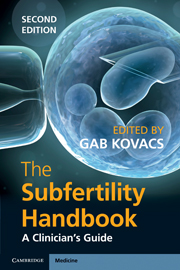Book contents
- The Subfertility Handbook
- The Subfertility Handbook
- Copyright page
- Contents
- Foreword
- Contributors
- Chapter 1 Subfertility – a logical approach
- Chapter 2 Pre-pregnancy counseling and treatment
- Chapter 3 The first interview with a new couple
- Chapter 4 Investigation of the female patient
- Chapter 5 Assessment of the male partner
- Chapter 6 Ultrasound in the investigation of the subfertile female
- Chapter 7 Treatment options for male infertility
- Chapter 8 The management of anovulation (including PCOS)
- Chapter 9 The role of artificial insemination with partner semen in an ART program
- Chapter 10 Early pregnancy loss
- Chapter 11 In vitro fertilization:
- Chapter 12 In vitro maturation
- Chapter 13 The use of donor insemination
- Chapter 14 Using donor oocytes
- Chapter 15 Embryo donation:
- Chapter 16 Endometriosis and its treatment
- Chapter 17 The role of surgery in female subfertility
- Chapter 18 Laboratory techniques in IVF
- Chapter 19 Infertility counseling
- Index
Chapter 8 - The management of anovulation (including PCOS)
Published online by Cambridge University Press: 06 December 2010
- The Subfertility Handbook
- The Subfertility Handbook
- Copyright page
- Contents
- Foreword
- Contributors
- Chapter 1 Subfertility – a logical approach
- Chapter 2 Pre-pregnancy counseling and treatment
- Chapter 3 The first interview with a new couple
- Chapter 4 Investigation of the female patient
- Chapter 5 Assessment of the male partner
- Chapter 6 Ultrasound in the investigation of the subfertile female
- Chapter 7 Treatment options for male infertility
- Chapter 8 The management of anovulation (including PCOS)
- Chapter 9 The role of artificial insemination with partner semen in an ART program
- Chapter 10 Early pregnancy loss
- Chapter 11 In vitro fertilization:
- Chapter 12 In vitro maturation
- Chapter 13 The use of donor insemination
- Chapter 14 Using donor oocytes
- Chapter 15 Embryo donation:
- Chapter 16 Endometriosis and its treatment
- Chapter 17 The role of surgery in female subfertility
- Chapter 18 Laboratory techniques in IVF
- Chapter 19 Infertility counseling
- Index
Summary
Keywords
- Type
- Chapter
- Information
- The Subfertility HandbookA Clinician's Guide, pp. 88 - 99Publisher: Cambridge University PressPrint publication year: 2010

